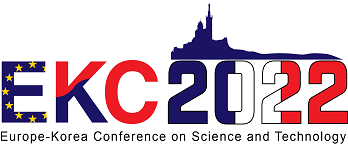PROGRAMME
Life Science & Health
Life science is a field of understanding the basic principles of sustaining life and seeks and provides application methods based on it. Life science is positioned not only as a basic field of study, but also as an important field that can overcome global issues. The search for sustainability in order to overcome hazards to mankind such as climate change, environmental pollution, and the human diseases, such as coronavirus pandemic is emerging as a major task in life science research.
The Life science and Health division embraces six sessions that discuss topics in the area of emerging technologies in biomedical science, agriculture, cancer, environments
Six sessions are organised at EKC 2022.
1. Sustainable Development in Biomedical Science and Technology
2. Emerging technologies to address agricultural issues with sustainability
3. Lifestyle Exposures and Cancer Prevention and Survival
4. Cutting edge techniques in molecular biology research
5. Our changing environment: Its molecular/cellular impact on biological systems and processes
6. Precision Medicine in Oncology: An Update
Programme Committee
| Date / Time | 2022-07-20 13:30 -- 15:10 |
|---|---|
| Room | Joliette |
| Conveners / Chairs |
|
| Synopsis | Artificial intelligence and machine learning are becoming dominant problem-solving techniques in many research areas. Also, next-generation sequencing as well as more developed single cell sequencing, and spatial sequencing techniques can offer deeper understanding of molecular mechanisms, phenotyping study, and solving complicated problems in life and health science. In this session, speakers will provide cutting edge techniques in the life sciences and its practical application. |
| Speakers |
|
| Date / Time | 2022-07-20 15:20 -- 18:40 |
|---|---|
| Room | Joliette |
| Conveners / Chairs |
|
| Synopsis | High technoloy of medical device & drug is one of the most importance key technoloies of human life science and health in the 21st centry. It will increasingly play a decision role in international competition and enables sustainable growth in numerous braches of indusstry.
We invite experts in this field to introduce cutting-edge medical devices capable of diagnosing and treating diseases and cutting-edge technologies in the field of drug development, and to introduce R&D trends internationally. In particular, we would like to introduce technology for early diagnosis of intractable cancer, and technology for effective diagnosis and treatment of metastatic cancer.
|
| Speakers |
|
| Date / Time | 2022-07-21 11:00 -- 12:30 |
|---|---|
| Room | Joliette |
| Conveners / Chairs |

PROF. CHOI, Yoon-la
Department of Pathology & Translational Genomics, Samsung Medical Center; Sungkyunkwan University, School of Medicine, Seoul, So Show Profile 
DR. NOH, Ka-won
Institute for Pathology, University Hospital Cologne; Position: Postdoctoral Researcher Show Profile |
| Synopsis | Background
Healthcare is ever-changing and the usage of new technology is becoming more critical to generate relevant data and assist the adoption of precision medicine. Precision medicine is a type of medicine that prevents, diagnoses, or treats disease by using information about patient's genes or proteins. Precision medicine in cancer uses specific information about a person's tumor to help with diagnosis, treatment planning, determining how well treatment is working, and predicting prognosis.
Purpose
However, the use of "omics" technologies and large sample sizes has resulted in massive amounts of data sets, and their analysis has become a major bottleneck, necessitating sophisticated computational and statistical methods. The challenge now is to turn the multi-parametric taxonomic classification of a disease into better clinical decision-making by more precisely defining a disease, given the wealth of information for different diseases and its link to intrinsic biology. Through this session, we plan to shed light upon the new developments in the field of precision oncology.
Significance
We now know that biological properties vary greatly not only between cancers but also between patients. Given the large number of treatment options that exist in a particular cancer entity, modern oncology is currently facing multifactorial interpretations to develop the "best treatment" for individual patients. To confront this issue, various strategies are being developed, such as data integration between different diagnostic modalities or the use of artificial intelligence and machine learning to improve the traditional symptom-driven practice of medicine, allowing earlier interventions using advanced diagnostics and tailoring better and economically personalized treatments. Through this session, various aspects and challenges of the emerging methodologies will be discussed, thereupon paving a path towards precision medicine and better patient outcomes.
Relevance to the theme of EKC2022
Precision medicine in oncology holds the promise of increased efficiency, improved care, and the elimination of ineffective treatments and costs. However, significant work remains to be done to prepare the oncological ecosystem to fully realize the potential of it. Through extensive exchanges of emerging technologies in devising individualized treatment plan for cancer patients, we hope to bridge the the valley of death across preclinical and clinical divide, leading to efficient and sustainable clinical responses in the field of translational oncology. |
| Speakers |
|
| Date / Time | 2022-07-21 13:30 -- 15:00 |
|---|---|
| Room | Salle 50 |
| Conveners / Chairs |

PROF. LEE, Hyojung
Kyungpook National University 
DR. CHOI, Sunhwa
National Institute for Mathemtical Sciences |
| Synopsis | There have emerged several coronaviruses, namely SARS-CoV, MERS-CoV, and SARS-CoV-2 within two decades. These coronaviruses as well as novel variant viruses are extremely dreadful and getting more serious as a global threthen. Moreover, the fast spread of misinformation about the outbreak causes worldwide panic.
To prevent the spread of infectious disease, Republic of Korea has adopted a local quarantine strategy rather than a global lockdown to effectively prevent the spread of diseae while minimizing economic damage. In order to give a scientific information, Analysis of epidemiological data and mathematical modeling were used to predict the spread of COVID-19 and make policy decisions. In addition, mathematical modeling can be analyzed to evaluate the effectiveness of control interventions, including pharmaceiutical intervention such as vaccination and antiviral treatment and non-pharmaceiutical intervention such as social distancing, face mask use, contact tracing.
In this session, we would like to introduce the situation of COVID-19 in Korea and the “K-quarantine” practiced at each period. Furthermore, we analyze the transmission dynamics along with control interventions of “K-quarantine” by usign mathematical modeling. Finally, we assesse the effect of th control strategies on the spread of infectious disease.
|
| Speakers |
|
| Date / Time | 2022-07-21 13:30 -- 15:00 |
|---|---|
| Room | Joliette |
| Conveners / Chairs |

PROF. KIM, Jeongseon
National Cancer Center, Korea 
DR. NOH, Hwayoung
Leon Berard Cancer Center (CLB), Lyon, France |
| Synopsis | Cancer is a leading cause of death and a major issue of public health worldwide, indicating that it has risen to 19.3 million cases and 10 million cancer deaths in 2020 (Globocan). The International Agency for Research on Cancer (IARC-WHO) estimates that 1 in 5 people develop cancer during their lifetime, and 1 in 8 men and 1 in 11 women die from the disease, globally. However, about 40% of cancer cases and deaths are linked to modifiable lifestyle factors (e.g. smoking, alcohol, weight status, diet, physical activity, and exposures to environmental carcinogens), and thus would be preventable. The topic of the proposed session will be "Lifestyle Exposures and Cancer Prevention and Survival” to seek sustainable ways to prevent cancer and improve cancer survival. There will be discussions and presentations based on recent scientific evidence from outstanding scientists on this topic. |
| Speakers |
|
| Date / Time | 2022-07-21 15:20 -- 16:50 |
|---|---|
| Room | Joliette |
| Conveners / Chairs |

DR. KO, Hee Kyoung
Researcher, University of Reading, UK & Visiting Researcher, University of Oxford, UK Show Profile |
| Synopsis | In the sprit of this year’s EKC 2022 theme of “Pathways to Sustainability”, we examine – in molecular and cellular detail - how the processes, pathways and mechanisms in living systems are being impacted by exogenous inputs from the environment. The resulting outputs that are currently being observed appear to be far-and-wide, pervading all levels of life – from the population as a whole to the individual organsm, from the physiology of the organs to that of the tissues, from our cells to the molecular and structural details of our biomolecules. In the biomedical sciences, these profound changes may lead to changes in the immune system (as inflammation or auto-immunity), transcriptional activation, in ROS (reactive oxygen species) and cellular defense, cell proliferation (cancer), diabetes, or perhaps even in the area of mental health.
What we learn in this session may provide us with clues from dealing with different types of toxic environmental pollutents to how these exogenous insults disrupt physiology and manytimes cause dieases. Our hope is that during this session, we will share constructive ideas and integrate knowledge from different fields, emerging with new ideas for new technologies.
|
| Speakers |
|




